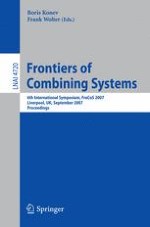2007 | Buch
Frontiers of Combining Systems
6th International Symposium, FroCoS 2007 Liverpool, UK, September 10-12, 2007 Proceedings
herausgegeben von: Boris Konev, Frank Wolter
Verlag: Springer Berlin Heidelberg
Buchreihe : Lecture Notes in Computer Science
